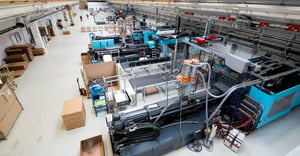Excellent results in the field of plastics manufacturing are a combination of a number of different factors. These require constant change and advancement that help us push our limits, develop new approaches and improve our processes.
Contact us to find out more. Send us an inquiry >>
One of the factors that plays a key role in plastics manufacturing is the technological capability of a machine park. We take the importance of technological capability very seriously and are devoted to continually improving our services in the field of plastics manufacturing. Let’s take a more detailed look at the importance of technological capability and the technological capabilities we offer at Skaza.
Overmolding
Overmolding is a molding process with multiple steps in which two or more components are molded one over another. There are multiple different types of overmolding, such as insert molding, injection molding, two-shot molding…
The process of overmolding brings a number of new possibilities into the world of plastics manufacturing. It enables us to create stronger and more aesthetic parts and add function to a product. Apart from that, it also lowers the cost of production.
Computer Vision and Control Systems
Computer vision is a scientific system that is capable of understanding images taken by the camera. It is used to efficiently process the details of the images and compare them to the provided data, thus verifying whether certain requirements have been met.
This system is used in plastics production to check products and parts for certain characteristics. For example, the computer vision system can check whether all threads are present in a screw. Based on the image, it determines whether the part is suitable or not, marking it OK or NOK. If the part is not suitable, it is automatically removed from the further process, which guarantees excellent control over the production processes.
Ultrasonic Welding
Ultrasonic welding is a process of joining and reforming plastic materials with the help of the heat that is the product of high-frequency mechanical motion. In order to use ultrasonic welding, both thermoplastic parts that need to be bonded must be made out of chemically compatible materials.
The ultrasonic welding process brings a number of benefits: it’s clean, efficient and fast. It also requires very little energy while producing strong bonds in final products. It is also a great choice for assembling difficult materials.

Automated Assembly Lines (with Machine Vision Control)
In manufacturing processes that require a high quantity of production assembly, the most sensible option is to have an automated assembly line with machine vision control. The automated assembly lines enable high-quantity production, while the machine vision control ensures that the items produced to meet all the necessary requirements and standards.
Heat-stacking
Heat-stacking is a process of joining two different materials by using local heating and cooling. The process usually involves two or more parts, at least one of them is plastic. The first step is to raise the temperature of plastic components, which allows the plastics reforming to be carried out, creating the final product.
Heat-stacking is an excellent choice for bonding metal to plastic, so it is commonly used in a wide variety of industries, including the automotive, IT and consumer appliances industries. This technique has many benefits, such as the absence of vibration damage and the capability to work with hard-to-reach and restricted areas.

3D Laser Engraving
3D laser engraving is a CNC system that is capable of producing 3D reliefs from wood, steel or other materials. The laser within the system removes parts from the raw material to create the required image. Laser engraving in plastics manufacturing is commonly used for engraving buttons, but it can also be used in a number of different applications according to the needs of the client.
Ink-jet Marking
Ink-jet marking is a technique commonly used on automatic assembly lines or automatic processing lines. The main goal of this process is usually to mark the production date or QR codes. The device used in ink-jet marking is a small printer that uses similar technology as any other ink-jet printer used at home. It presents a quick and inexpensive solution for markings that are required on parts or packaging.
The importance of technological capability in plastics manufacturing is thus not to be overlooked, as it plays a key role when it comes to the quality, price and production speed of plastic products. With the right capabilities, the entire manufacturing process runs a lot more smoothly and efficiently. This is one of the main reasons why at Skaza, we pay special attention to making sure our technological capabilities always remain at the highest standard and continue to improve further every year.
Looking for a partner who will manage high demands in manufacturing plastic products? Get a quote and become our partner.


